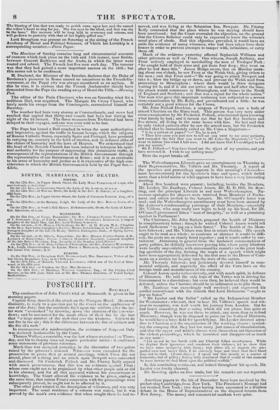The Wolverhampton Liberals gave an entertainment on Thursday to their
Representatives, Mr. Villiers and Mr. Thornely. A report of
the speeches and proceedings appears in this morning's Gimmick— roost inconveniently for the Spec/Woe's time and space, which forbid. more than a brief notice of vhat appears to have been a very interesting meeting.
About five hundred were present ; including, besides the Members, Mn. Leader, Mr. Easthope, Colonel Anson, Mr. M. 1). Hill, Dr. Bow- ring, and the principal Liberals in and near Wolverhampton. Nu- merous apologies for absence were received front Members of Parlia- ment and others invited to the banquet. Mr. O'Connell's letter was read ; and the Wolverhampton .constituency must have been amused by the Agitator's condescending patronage of' their Members,—especially Mr. Villiers, who may really now begin to hold up his head, for Mr. O'Connell pronounced him a " man of integrity," as well as a promising speaker in Parliament I The Chairman, Mr. John Barker, proposed the health of .Ministers in complimentary terms ; though he wished Colonel Anson would tell Lord Melbourne " to jog On a little faster." The health of the 'Mem- bers followed ; and Mr. Villiers rose first to return thanks. his speech ought to be read as a whole : to condense or abstract it would be diffi- cult, the parts are so closely fitted together ; and it would stiffer by cur- tailment. Abstaining in general from the hacknied connnonplaces of party politics, lie skilfully interwove passing hits, where party allusions were locally unavoidable, with statesmanlike remarks on the great lead- ing. questions of the day, thrming the staple of a speech which might have been appropriately delivered by the first man in the House of Com- mons on a motion for inquiry into the state of' the nation.
Mr. Thornely followed ; and judiciously devoted himself to com- mercial subjects, and especially the effect of the Corn-laws on the foreigu trade and tnanufactures of the country.
Colonel Anson spoke rather cleverly, :And with much spirit, in defence of Ministers, lie said the only hope of the Tories was in driving the Government to it dissolution ; but even then, he believed they )vould be defeated, unless the Chartists should be so infatuated Os to join them.
Mr. Easthope was exceedingly well received and expressed his cordial concurrence with the remark that Lord Melbourne " ought to jog oil faster."
" Mr. Leader and the Ballot" called up the Independent Member for Westminster ; who said, that to bear Mr. Villiers's speech and wit- ness its reception, was well worth his journey front London. lint he had !ward something that e citing which did not please him quite so much. However, he was ma there to attack, any more titan to defend Ministers ; though were he disposed to point out the fruits of Ministers, he would have a large field for speechifying.. Mr. Leader directed atteu- timt to Chartism a t:d the organization of the working classes : remind- it tg the company that they had too many just causes of' dissatisfaction, and that the it en and middle classes were themselves not blameless of the violent proceedings, which he lamented and disapproved as much as any man-
" Let its not be too harsh with our Chartist fellow cohntrymen. While we deplore their ignites ice and condemn their violence, let us show that we have smite sympathy wit It them ; and above all, as regards the mis- guided men now under trial, I do sincerely hope and trust that their blood may not he shed. (Loud chrer.i.) I speak not this merely tie at matter of Ii umanity, hut of pokey; feeling intly cenvinced that it would at this moment be most unnise to shed blood upou the political scaffold."
In IhiS concluding sentiment, and indeed throughout his speech, Mr. Leader was loudly cheered.
Dr. Bowring spoke on free trade, but his remarks are not reported.
































 Previous page
Previous page